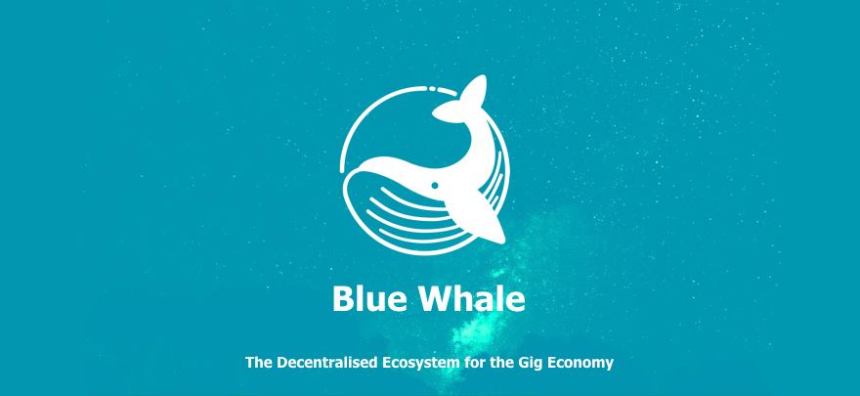Rewards, Transparency, and Value: blockchain’s answer to freelancing
The state of the gig economy is in a precarious situation – facilitated by the leveling of the marketplace, in part. If you look at any of the current leading service providers for freelancers and their employers, you might notice that after a while: both sides present some recurring complaints.
Key issues include extortionate service fees (often applied to both participating sides of a freelance contract), slow processing times, and a lack of customer support. Unfortunately, it’s now been a while since a new contender has had a significant disruptive impact on the market.
That was, until a unique solution based on decentralized blockchain technology decided to enter the arena…
To Decentralize & Disrupt an Industry
The Blue Whale Network is partnering with Verlocal to create the next evolutionary step in introducing blockchain technology for the freelance industry. Verlocal is a company specializing in the creation and distribution of various SaaS solutions. These include a tried and tested, pre-existing freelance marketplace and economy infrastructure.
Essentially, it is a decentralized take on the freelancing platforms and web services that you may be already familiar with. Verlocal hopes to prove to the world that blockchain / distributed ledger technology can improve upon the (centralized) gig economy just as significantly as it has fiat currencies.
Both the Blue Whale Foundation and Verlocal are headed by Will Lee, a crypto entrepreneur possessing a strong vision, along with a portfolio of qualifications and professional experience. What’s different about Lee and his team’s approach to the freelancing sector, is that they offer unrivaled standards of partnership, support, and facilities to their clients.
Furthermore, the organization has been incrementally growing their talent, having recently added the co-founder of OKCoin to their team (Professor Arturo Bris) as an advisor.
Hail to the Whale: The Benefits of Blockchain Freelancing
The original use case for blockchain technology was Bitcoin, and subsequently cryptocurrencies.
Features offered by this phenomenon include anonymization and encryption of user data, whilst allowing these users to privately access information pertaining to them through use of a private/public key system. In terms of finance, the high commission fees and slow payment processing times are to be negated using a proprietary cryptocurrency token (BWX).
According to the white paper, BWX will be used for all financial transactions which take place on their platform. This isn’t just between client and freelancer, but also for their revolutionary advertising and referral schemes. By introducing new methods of revenue generation, Blue Whale aims to significantly reduce costs associated with traditional online freelancing platforms.
CAM DAN ReBa: Big Fish, or a Blowhole?
Blue Whale themselves have actually published what they consider to be the ‘three pillars’ of their platform’s underlying proposition. These are all considered to be both decentralised applications (‘dApps’) and APIs, which means that they can be adapted and implemented by third parties.
These are referred to by the team themselves as the Blue Whale ‘WORK’ (Worker Optimized Reward Keeper) – which comprises a set of tools and functions divided into three distinct categories…
Contribution Activity Manager (CAM)
- The system which supports the tracking and distribution of rewards to users. These incentives are rewarded for the completion of a range of tasks, including successful introduction of new clients or freelancers to the platform. Other bounties include successful driving of traffic to various service providers as an influencer and established recommender; as well as community-driven conflict resolution & reputation verification.
Decentralized Associated Network (DAN)
- This is the name which Blue Whale uses to refer to its community of freelancers and clients; denoting the advanced level of interconnectivity afforded by their platform. One of the main draws for both parties is the competitive cost and value propositions. The benefits of their decentralized relational databases are linked to the implementation of cutting-edge machine learning activity; resulting in a truly bespoke yet-secure service. Additional unique selling points of this network include the provision of a comprehensive suite of valuable business development tools – giving freelancers unparalleled support for scaling and streamlining their operations.
Reward Bank (ReBa)
- A decentralized entity, accountable for the automated processing of payments, both receipt, and distribution, for the Blue Whale eXchange (BWX) coin. The activities and decisions implemented by the Reward Bank are informed by the algorithmic and machine learning systems contained within the DAN. Additionally, all transactions are transparent & trackable on the ICON decentralized blockchain – with agreements enforced via smart contracts.
The Blue Whale ICO is slated for a May 2018 launch. If their pre-launch funding round is anything to go by (25 million Singapore Dollars raised): then the hard cap is going to be reached extremely quickly for the public launch in May
Check out their website, social media (Facebook / Twitter), whitepaper and Telegram group if you are interested in learning more.
Keep an eye out in the following weeks for big news regarding forthcoming partnerships with traditional / ‘centralized’ businesses.




















That is a really weird name for an ICO, The “blue whale game” is a very odd thing to be connected to your crypto